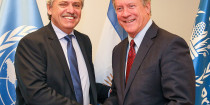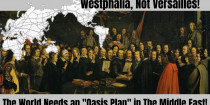Excerpt from the November 12 Schiller Institute conference, “The Physical Economy of the Noösphere: Reviving the Heritage of Vladimir Vernadsky“
In this time of great political tumult, of controversy concerning the positive role of human technological progress, and of the growing danger, whether through design or miscalculation, of military conflict between thermonuclear powers, the revolutionary ideas of the great Soviet, Russian–Ukrainian scientist Vladimir Vernadsky (1863–1945) demand to be examined and studied. This is particularly true of Vernadsky’s concept of the noösphere, the physical-economic sphere by means of which human scientific thought becomes the predominant force in our universe.
Amid calls to divide the world into ideological camps, the concept of the noösphere demands a new paradigm, one that brings humanity closer together rather than further apart.
Central to the noösphere is maintaining a fundamental commitment to the advancement of science, that is, to realizing those fundamental breakthroughs in scientific thought, which, when implemented in the productive process, enhance the power of man in the biosphere. While Vernadsky’s primary scientific contribution was his discovery of the powerful function of “living matter” in transforming and enhancing the very nature of the underlying inert universe through the “migration of atoms,” so too he saw that man, through the development of his scientific thought, was having a similar effect on transforming and enhancing the work of the biosphere.
Towards the close of Vernadsky’s life, as World War II was coming to an end, he insisted that it was urgent for countries to unite their forces in working together to realize the common aims of mankind, a commitment which he shared with the Soviet Union’s wartime ally, America’s Franklin Delano Roosevelt.
This symposium is dedicated to reviving the name, ideas, heritage, and mission of this seminal scientist. We have assembled noted scientists from around the world to come together to discuss fundamental scientific advances being made, or soon to be made, in their respective fields of activity, many of which were also fields of inquiry for Vernadsky. In the afternoon, we will discuss some of the physical engineering projects underway in various parts of the world to improve the condition of mankind — to develop the noösphere.











